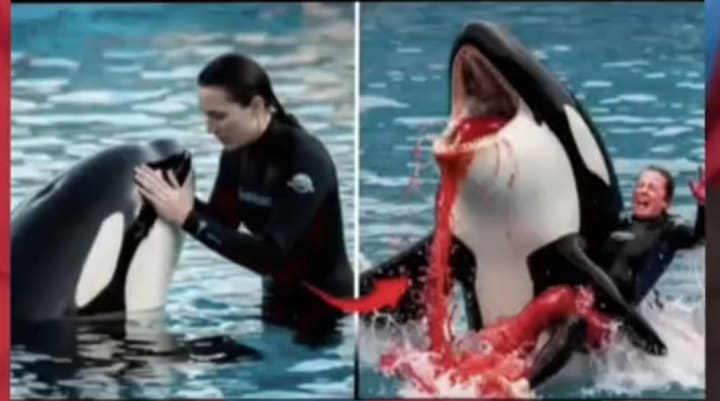Share this @internewscast.com
A viral video took social media by storm, depicting a supposed marine trainer, Jessica Radcliffe, being attacked by an orca during a performance. This clip incited shock, sorrow, and debate until investigators uncovered a surprising fact.
The dramatic footage, filled with fearful screams and water tinged with red, was completely counterfeit. The alleged attack never took place, and the character of Jessica Radcliffe is entirely fictional. Here is the real story.

Is Jessica Radcliffe Still Alive?
No individual named Jessica Radcliffe exists, nor did the purported orca incident occur. Fact-checkers determined the viral clip was AI-produced, mixing fake images, altered sounds, and footage recycled from unrelated scenes.
Officials discovered no documentation of any marine trainer by that name, no incident files from any facility, and no legitimate news sources supporting the supposed event. According to one report:
“Investigators assert that everything, from the trainer’s identity to the marine park narrative, was invented. They tricked the masses using AI-crafted visuals and audio.”
How the Fake Video Fooled the Internet
The footage, circulated extensively on TikTok and Facebook, portrayed “Jessica Radcliffe, 23,” engaging with an orca before a fabricated attack. Some iterations even suggested:
“The orca was provoked by menstrual blood mixing with the water—a baseless and scientifically unfounded detail added for shock value.”

Experts noted the video’s unnatural elements:
- AI-generated crowd noises with flat, robotic tones.
- Mismatched water physics, with splashes moving unnaturally.
- Fictional locations, like “Pacific Blue Marine Park,” which doesn’t exist.
Despite these red flags, the video spread rapidly—fueled by real past tragedies involving captive orcas.
RIP JESSICA Radcliffe pic.twitter.com/PVsJ62vpMK
— SPECIAL💙🎖️🦅 (@OfCL_Special) August 10, 2025
Real Orca Attacks That Made the Hoax Believable
While Jessica Radcliffe’s story was hoax, history does include deadly orca incidents:
- Tilikum, the infamous orca, killed three people, including SeaWorld trainer Dawn Brancheau in 2010.
- Keto, another captive orca, fatally rammed Spanish trainer Alexis Martínez in 2009.
- In 1991, Keltie Byrne drowned after being dragged underwater by Tilikum and two other orcas.
These real cases lent credibility to the hoax, playing on public fears about orca captivity.
Why Fake Stories Like This Keep Spreading
Misinformation thrives when it mixes truth with fiction. As one analysis noted:
“The viral hoax about Jessica Radcliffe may have been made up, but the danger of captive orcas is real.”
Social media algorithms prioritize emotional content, and AI tools now make fake videos harder to detect. Fact-checkers urge viewers to:
- Check multiple sources before sharing.
- Reverse-search images/videos to find origins.
- Look for inconsistencies, like unnatural movements or AI voices.
Also Read: Meet Kristin Cabot’s Husband: Biography, Age, and Role as Chief of HR in Astronomy





